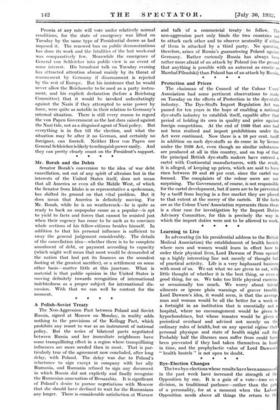A Polish-Soviet Treaty The Non-Aggression Pact between Poland and Soviet
Russia, signed at Moscow on Monday, in reality adds nothing to the provisions of the Kellogg Pact, which prohibits any resort to war as an instrument of national policy. But the series of bilateral pacts negotiated between Russia and her immediate neighbours have some tranquillizing effect in a region where tranquillizing influences are more needed than in most. That is par- ticularly true of the agreement now concluded, after long delay, with Poland. The delay was due to Poland's reluctance to sign except in company with her ally Rumania, and Rumania refused to sign any document in which Russia did not explictly and finally recognize the Rumanian annexation of Bessarabia. It is significant of Poland's desire to pursue negotiations with Moscow that she should have declined to wait for the Rumanians any longer. There is considerable satisfaction at Warsaw and talk of a commercial treaty to follow. The non-aggression pact only binds the two countries not to attack each other and to observe neutrality if either of them is attacked by a • third party. No question, therefore, arises of Russia's guaranteeing Poland against Germany. Rather curiously Russia has always been rather more afraid of an attack by Poland (on the ground that anything is possible with an autocrat as erratic as Marshal Pilsudski) than Poland has of an attack by Russia.






























 Previous page
Previous page